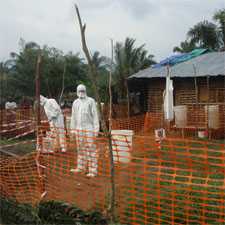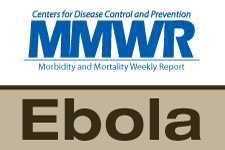Prevention

MSF (Médecins Sans Frontières) health staff in protective clothing constructing perimeter for isolation ward.
There is no FDA-approved vaccine available for Ebola.
If you travel to or are in an area affected by an Ebola outbreak, make sure to do the following:
- Practice careful hygiene. For example, wash your hands with soap and water or an alcohol-based hand sanitizer and avoid contact with blood and body fluids (such as urine, feces, saliva, sweat, urine, vomit, breast milk, semen, and vaginal fluids).
- Do not handle items that may have come in contact with an infected person’s blood or body fluids (such as clothes, bedding, needles, and medical equipment).
- Avoid funeral or burial rituals that require handling the body of someone who has died from Ebola.
- Avoid contact with bats and nonhuman primates or blood, fluids, and raw meat prepared from these animals.
- Avoid facilities in West Africa where Ebola patients are being treated. The U.S. embassy or consulate is often able to provide advice on facilities.
- Avoid contact with semen from a man who has had Ebola until you know Ebola is gone from his semen.
- After you return, monitor your health for 21 days and seek medical care immediately if you develop symptoms of Ebola.
Healthcare workers who may be exposed to people with Ebola should follow these steps:
- Wear appropriate personal protective equipment (PPE).
- Practice proper infection control and sterilization measures. For more information, see U.S. Healthcare Workers and Settings.
- Isolate patients with Ebola from other patients.
- Avoid direct, unprotected contact with the bodies of people who have died from Ebola.
- Notify health officials if you have had direct contact with the blood or body fluids, such as but not limited to, feces, saliva, urine, vomit, and semen of a person who is sick with Ebola. The virus can enter the body through broken skin or unprotected mucous membranes in, for example, the eyes, nose, or mouth.
- Page last reviewed: July 22, 2015
- Page last updated: July 22, 2015
- Content source:




 ShareCompartir
ShareCompartir